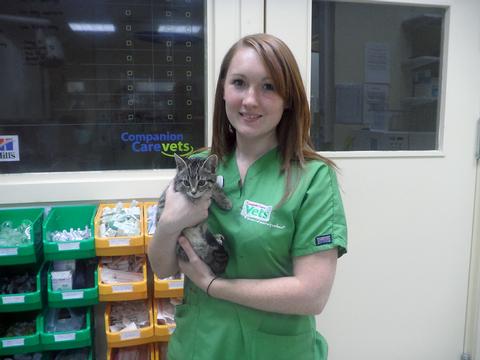Becky Jordan


You could be a… veterinary hospital nurse
Becky Jordan, from Birmingham, graduated with a foundation degree (FdSc) in Veterinary Nursing in 2010. She was appointed Head Nurse at Companion Care, Worcester, before moving to Willows Veterinary Centre and Referral Service in 2013.
We caught up with Becky just as she was about to begin her exciting new job at Willows, a state-of-the-art veterinary practice located in the West Midlands. The practice provides top-quality veterinary care both for pets in the surrounding area and also for those referred by other own veterinary surgeons for specialist investigation and treatment.
The 26-year-old is joining a large team of veterinary surgeons, specialists, clinicians and managers, and like all RVNs will have to find her feet quickly in a challenging, fast paced, but extremely rewarding role. Fortunately, she has three years of experience in various roles to draw on.
“Upon leaving university I stayed at my training practice for about six months and then went travelling for a further seven months. Once I returned to the UK I started doing locum work, where I worked for short periods in a number of practices, including animal hospitals and referral centres. One of my jobs was at Companion Care and after locuming for them for a week they offered me the position of veterinary nurse. After six months of hard work setting up nursing clinics and improving the nursing standards I was offered the position of Head Nurse. Naturally I was over the moon”
There is no such thing as a typical day in a veterinary practice, says Becky, and one has to be prepared for anything. “It all depends on what animals come through the door. I may have started off with either consulting, caring for inpatients or being in theatre.”
RVNs have to be both organised and flexible. “Being a Head Nurse meant I was available to work where I was most needed at that particular moment in time. I tried to take an hour every day to work on nurse training with the trainees or their portfolio work. I spent around another hour contacting clients, checking on patients we were treating as outpatients or clients in need of advice. If I still had time in the day I would take a further hour or so carrying out administration duties such as stock control, insurance forms and laboratory results.”
Although hard, it is work that Becky, who was nominated for PetPlan’s Veterinary Nurse of the Year 2013, loves and thrives on, so she never feels fed up with her career choice. But what is the best thing about her job? “Firstly, working with the animals: there is nothing more satisfying than knowing that you have helped to assist in an animal’s recovery and then watch them go home, fit and well. Secondly the people I work with: the key is to always work as a team.
“And then there is communicating with the clients: sometimes you are the only person they feel they can talk to about how upset they are - it’s nice to assist them especially when it’s a happy ending.”
And what advice would she give to students considering a similar career? “This is one of the most satisfying jobs in the world, but please be aware that you have to work hard. It’s not a 9-5 job and some days you will work so hard that you can barely find time to eat but it’s all worthwhile. No matter how tired you are, at the end of the day you always go home feeling satisfied, knowing you have helped to make a difference to an animal’s life and that of their owner.”
Becky’s job includes
- General and theatre nursing, including the maintenance and preparation of sterile supplies and instruments
- Assisting with radiography
- In-patient care including: pre-op care/medication monitoring, recovery period and post-op care, medication and physiotherapy
- Ensure kennels are maintained in a clean and sanitary condition
- Stock control
- Cleaning and maintenance of premises, especially prep room, radiography, theatres and kennels
- Providing assistance to veterinary surgeons, as required, at all times
- Performing Schedule 3 procedures under the guidance of the veterinary surgeon and according to experience
- Accurate record keeping of medical records, anaesthetic sheets and hospitalisation forms
- Obtaining samples for laboratory testing
- Dispensing medication as instructed by the veterinary surgeon
- Assisting nurse manager and practice manager
- Running and managing nurse clinics for weight, diabetes, puppies and kittens, dental care, nutrition, arthritis and geriatric clinics
- Training student nurses (as a clinical coach)
Becky on Harper Adams
“Without Harper Adams I couldn’t do the job I am doing today. It was the knowledge they shared and the support that they gave me that made me the nurse I am today.”
Why did you choose to study at Harper Adams?
When I visited the campus I found the atmosphere to be welcoming, everyone appeared happy, supportive and full of encouragement. The dyslexia support was outstanding and the veterinary nursing department friendly with a high success rate.
What were the highlights of your course?
I enjoyed the lectures; they were delivered in a way that made them easy to follow and in an informative manner. The teaching is outstanding. All the lecturers were very supportive and happy to spend extra time explaining the work. The facilities are impressive too, with fully equipped labs and veterinary department. The nurse unit was well equipped to prepare me for what a real veterinary practice is like.
Did it help your career opportunities?
The amount of time spent on placement ensured that getting a job post university was easy and the confidence I had gained enabled me to carry out my job in a professional manner once I had finished my studies.
What are your favourite memories?
Practicing for my OSCE exams in the nursing unit; I was there every day for the week before my exam and I felt such a sense of achievement when I perfected a task. As stressful as that time was, I remember how helpful both my peers and the staff were. Oh, and of course the summer ball.
Would you recommend Harper Adams to other students?
It is a brilliant place to study within a warm and friendly environment.
Becky on her work placement
What did you do on your work placements?
My first year placement, which was a few weeks long, was at Acorn Vets in Studley, Warwickshire, as a trainee veterinary nurse. I achieved my level 2 here.
My year-long placement, in the second year of my course, was spent at Iffley Vets in Oxford as a trainee veterinary nurse. I achieved my level 3 here.
In both these placements I worked through the vet nursing portfolio all students have to complete. I did benefit for the block year I spent in practice. I became part of the team with my own responsibilities rather than just being the placement student.
What would you do in a typical day?
I would firstly check all the inpatients, clean them out, walk them, feed and medicate as necessary. When the veterinary surgeons arrived we would check over all the inpatients and make a plan for the day.
Usually I then went into theatre where I would work with the veterinary surgeon on pre-medicating the patient, monitoring the anaesthetic and post-operative care of the elective procedures. I worked with a very supportive team and if I had any problems there was always a fully qualified veterinary nurse to help me.
Once all the patients were recovered I would start the cleaning tasks; cleaning is a major part of the jobs as infection control is very important in any medical environment.
My other tasks would include working on reception and keeping up to date records on patients.
During this time I found the medical tasks to be the most fulfilling cases - seeing the patients leaving once when they were better made all the hard work and long hours’ worthwhile.
It’s impossible to pick one area which was more useful as all areas helped me become the nurse I am today and improved my nursing skills.
What did you enjoy most?
Helping and supporting the clients, the staff I worked with and improving my knowledge and understanding of veterinary medicines.
Do you think placement enhanced your career prospects?
Without a doubt. Without doing work placements I would not have been able to qualify as a veterinary nurse, nor would I have the knowledge the carry out my job. Nothing can replace hands on experience.





